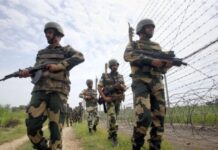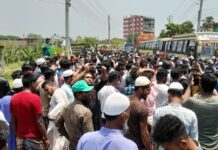Ashif Islam Shaon, Rafe Sadnan Adel
Snatching of three convicted JMB leaders was a wakeup call
The law enforcers earlier claimed that they had broken the backbone of banned militant outfit Jama’atul Mujahideen Bangladesh (JMB), which came up with much-unprecedented scale of terror attacks including the simultaneous blasts of 459 time bombs in 63 districts on August 17, 2005.
But it did not happen, apparently because of the ongoing regrouping efforts carried out secretly by the organisers of the group, which was banned on February 13, 2005.
In the recent times, the JMB has again become a matter of concern for the law enforcers, especially after the snatching of its three convicted leaders from police custody in Trishal, Mymensingh in February this year.
Moreover, three JMB members were arrested in the capital’s Sayedabad area on July 30 with huge explosives in their possessions. Detectives quoting the arrestees said at least four businessmen in Dhaka were financing the revival of the banned outfit.
With the money, the JMB has bought land in Bandarban and Cox’s Bazar areas, and set up camps to train its new members.
These incidents suggest that the banned outfit is still active with the capability to carry out devastating attacks.
Sources in the law enforcement agencies say the JMB men have chosen the northern districts to reorganise the group while security experts said it had also concentrated on the hilly areas and was using the members of the Rohingya community to spread its new network.
For the law enforcement agencies, the Trishal incident was a wakeup call, and now they admit that the outfit is trying to be reorganise. They claim that two of the three JMB leaders snatched from a police van in Trishal have been regrouping the outfit from hideout. The other died in a shootout soon after the snatching incident.
In the new format of plan, they are training the newly-recruited youths on the use of small arms instead of bombs.
Detectives in 2009 said the JMB had close links with the Rohingya Solidarity Organisation (RSO), an insurgent group in the Arakan state of Myanmar. Senior leaders of the JMB had received training from the RSO’s arms experts in a camp near the Myanmar border in 2002.
Executed JMB chief Shayakh Abdur Rahman had sent his men for the training. In exchange for the firearms lessons, the JMB trained Rohingyas to improvise and set off bombs. Harkat-ul-Jihad-al Islami (Huji) Bangladesh, another outlawed Islamist outfit, too had strong connections with the RSO.
Talking to the Dhaka Tribune last night, RAB Additional Director General Col Ziaul Ahsan also acknowledged that the JMB was reorganising.
He admitted that the Trishal incident had been a failure of the intelligence wings of the law enforcement agencies including the elite force.
“Now we have found that the JMB is trying to spread their network from Rajshahi, Chapainawabganj and Nilphamari districts. We have deployed more members in plain clothes and informants in those areas.
“But due to manpower shortage, the force is not as capable as it was in the previous times.
“Salauddin Ahmed alias Salehin and Zahidul Islam alias ‘Boma Mizan’ [snatched from police custody] are still traceless. Their whereabouts are still unknown.”
However, Prof Abdur Rob Khan of North South University, who observes security issues, said the JMB members had intensified their activities, especially recruitment and training, in the Chittagong Hill Tracts region and Cox’s Bazar.
“They are now using the Rohingya people. Besides, the JMB men have been divided in small groups and are using different names to confuse the law enforcers,” he said.
Rob also said the JMB had established connections with some Middle East countries which are riddled with political and military crises.
“From our country, many militants have gone to Syria, Palestine and Iraq to take part in wars. On the other hand, the militants there are assisting them with money and arms. It is alarming,” he said.
Rob also observed: “Some Islamic NGOs which used to provide the local militant groups with money have cut down assistance because of the crackdown by intelligence agencies. Therefore, the militant groups are now using gold smuggling channels to bring in financial support from abroad.
“I think RAB’s traditional system of curbing militancy will not work out now. They have to concentrate on the preventive measures,” he said.
The law enforcers said the JMB was collecting arms and explosives directly from the bordering areas.
According to RAB sources, nearly 300 operatives of different militant groups have secured bails at different times since 2005. Of them, 192 belonged to the JMB while 72 of the Huji.
The law enforcers are in dark about 91 militants. RAB sources said of them, 20 were dangerous. They are Faruq, Shafique, Milon, Sabuj, Sajedur, Manik, Majid, Kofil Uddin alias Rob Munshi, Azibun Islam, Shahan Shah, Hamidur Rahman, Bazlur Rahman, Babar, Sharif, Khairul Islam, Nadim, Moyez Uddin, Titumir and Waliullah Hamid.
The elite force considers Boma Mizan as the most notorious criminal among the JMB leaders. He was the commander of JMB’s military unit. Most of the bombs blasted in the 2005 series bomb attack were made under his supervision. He was a close associate of Shayakh Abdur Rahman.
Boma Mizan was arrested on May 14, 2009 from Taltola market area in the capital’s Agargaon while her wife Sharmin Akhter Lota from Pirerbagh the next day. Lota’s right wrist went off while hurling a grenade at the RAB personnel who had been in an operation to arrest her.
Huge amount of explosives were recovered from different places as per information gleaned from these duo. The recovery indicated that the JMB was organising alarmingly.
Trials not finished yet
Two people were killed and more than 400 people sustained injuries in the attacks on August 17, 2005.
Nine years have passed but the trials of the JMB men for the series bomb attacks are yet to complete.
According to the detectives, the police have submitted charge sheets in 289 out of 322 cases filed over the attacks. The district courts have delivered verdicts in 102 cases awarding death penalties to 35 militants, life term to 131 and jail of different terms to 184 JMB leaders and activists.
Of the total cases, 174 are under trial while the law enforcers have submitted final reports in 25 cases. The police are yet to finish investigation in rest of the cases.
Following the inception of the JMB in 1998 with a view to establish Shariah law in the country, their subversive activities began with the series blasts in 2005.
They first targeted the judicial system of the country – at least 38 attacks where at least 33 people, including judges, policemen and general people had been killed.
On November 14, 2005, the JMB men bombed judges – Sohel Ahmed Chowdhury and Jagannath Paare – in Jhalakathi. Then the police nabbed JMB member Iftekhar Hasan Al Mamun red handed.
In the case filed over the incident, JMB chief Abdur Rahman, its operations chief Siddiqul Islam alias Bangla Bhai and five others were sentenced to death. Six of the convicted were hanged on March 29, 2007.
Moreover, death sentences of 35 militants awarded in different cases have been pending with the High Court.
Source: Dhaka Tribune









